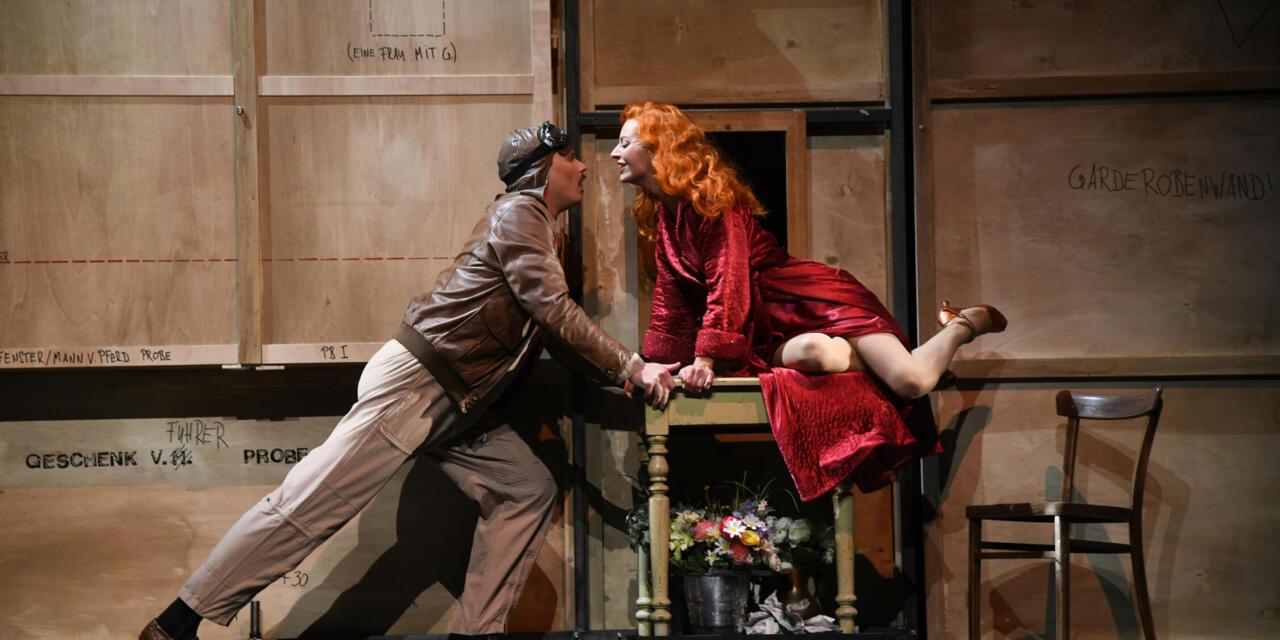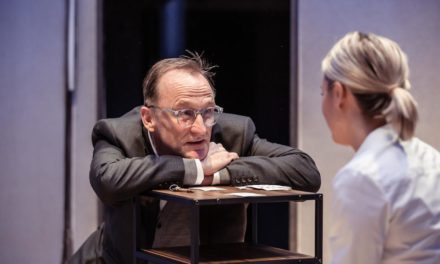Sein oder nicht sein is a play by Nick Whitby (b.1963), premiered on Broadway in 2008, and first presented in Germany at Deutsches Theater Berlin in 2009. It is based on the 1942 film of the same title by Ernst Lubitsch, with a script written by Edwin Justus Mayer and Melchior Lengyel. The play follows both the overall plot and in large parts the dialogue of the film. The play is thus set in Poland, starting some days before the German invasion of Poland that launched the Second World War. A theatre company in Warsaw is shown working on a play that is comically and bitingly critical of Nazi Germany. The Polish authorities forbid the production to go ahead for fear of the German response. The war breaks out, and the company find themselves suddenly in a country under siege. They get involved, unwittingly, in a plot to prevent German authorities from getting hold of a list with all the names of the Polish underground movement. In the process, they have to overcome internal issues of love and jealousy and use all their skills of the theatre, playing various of the leading highest officials of the German occupational force, as well as a dangerous double agent.
For the Bremerhaven production of this play, Sven Hansen made good use of the entire stage space, relatively large for a municipal theatre of a medium-sized city. The stage represented the theatre, onstage and backstage depending on the scene, in which the play is set, in the manner of true realism, allowing the company to make the Germans believe in the scenarios they are creating for them. Jenny Schall’s costumes added to this realism. Her sister, Johanna Schall, directed with authority that was evident throughout – the blocking in the different stage set-ups, the creation and maintenance of arcs of suspense, and an eye for characterization and character development. The level of precision was evident at all times. It was refreshing to see the amount of nuances of characterization she was able to draw from the actors. At a municipal theatre like Bremerhaven, the current resident company of ten actors will be working on a total of ten productions in one season. It constitutes quite an achievement for a director to inspire her cast to develop new aspects of their acting: differentiations, shades, nuances regular audiences will not have heard or seen from those very familiar actors before, and in that sense unpredictable material. Schall has worked extensively in theatre as a director and as an actor – this experience showed. She also happens to be a grand-daughter of Brecht, and her theatre-saturated life must have played a part in shaping her as an artist.
Henning Z Bäcker played the actor Josef Tura, so upset when he suspects his wife Maria having an affair, and central to the plot of preventing the Germans of getting hold of the list of members of the underground. He was very funny indeed as needed, maintaining a fine line between remaining believable as a good actor and making the audience laugh at the elements of ham-acting. Julia Lindhorst-Apfelthaler as Maria Tura, his wife, captured the diva-nature of her character fully, while remaining humanly accessible at the same time — enjoying her daring flirtation with pilot Sobinsky, her playing with the jealousy of her husband, while always maintaining control. She made sure with ease that she was adored by all. Marc Vinzing played both the pilot Sobinsky, giving him youthful, naïve charm together with professional aplomb, and Gruppenführer Erhardt, the head of the Gestapo in Warsaw, and as such the main Nazi character in the play. Here, Vinzing was successful in maintaining the balance between ridicule (extreme obesity thanks to a clever costume and a hilarious speech impediment) and audiences never doubting the real, deadly danger this character was representing.
Martin Kemner has been a regular visiting actor with the Bremerhaven company since at least 1997. He played both the official from the censorship office in pre-war Warsaw, relaying the decision that the play about Hitler was not permitted to be performed, and, more importantly, the double agent, Professor Silewski. He was suitably authoritative as the government official, and creepily sinister as the spy. Alexander Smirzitz played the theatre director. As with many of the characters, Johanna Schall had emphasized at least two sides to his nature, and as a result, Smirzitz maintained a fine balance between a man you could believe as person to run a theatre company successfully both in financial and artistic terms, and the funny exaggeration of “arty” behavior and manner of speaking. Marsha B Zimmermann made the most of her smaller role as the company’s wardrobe lady, mixing in and contributing hands on to the development of events with a sharp mind and quick thinking. Bremerhaven resident company stalwarts Frank Auerbach and Kay Krause contributed well-developed, moving portrayals of the actors Rowicz and Grünberg, respectively.
This post was written by the author in their personal capacity.The opinions expressed in this article are the author’s own and do not reflect the view of The Theatre Times, their staff or collaborators.


















